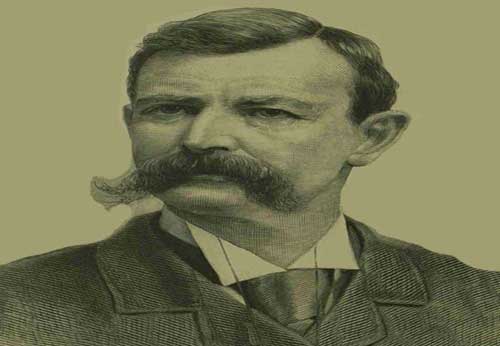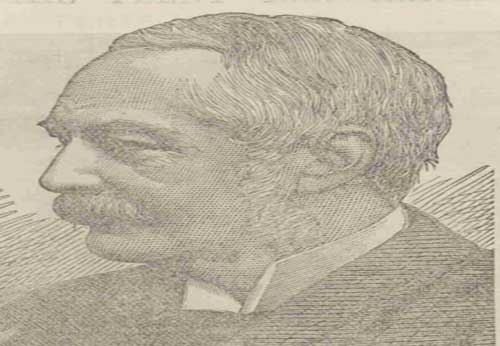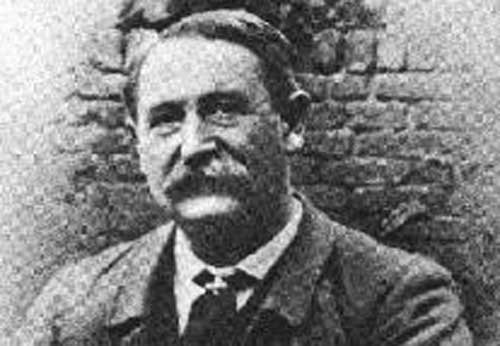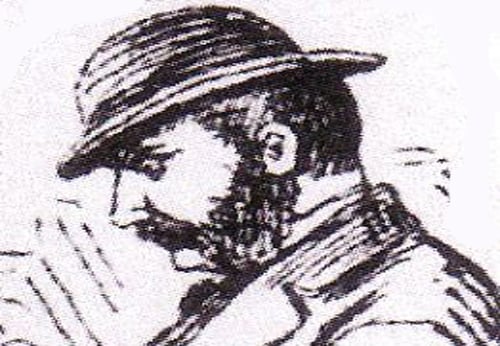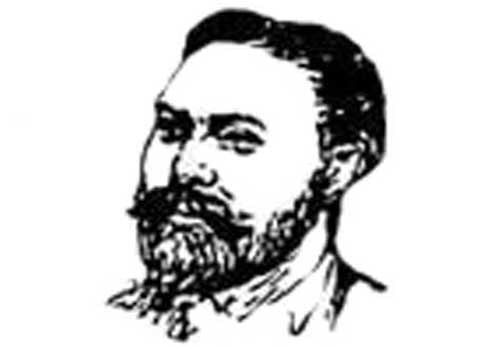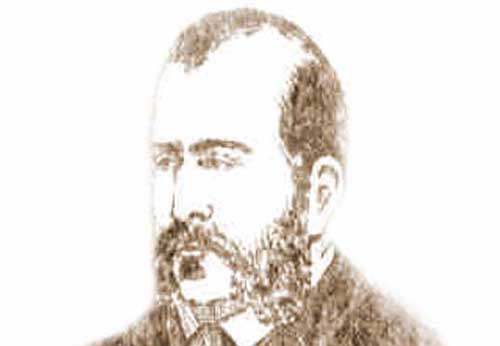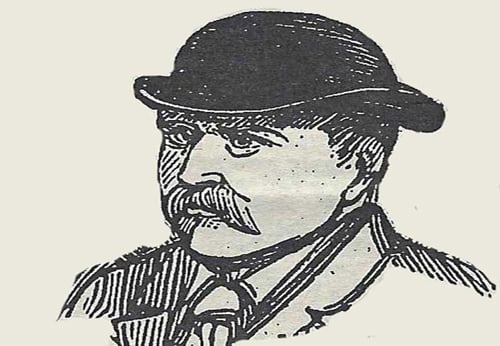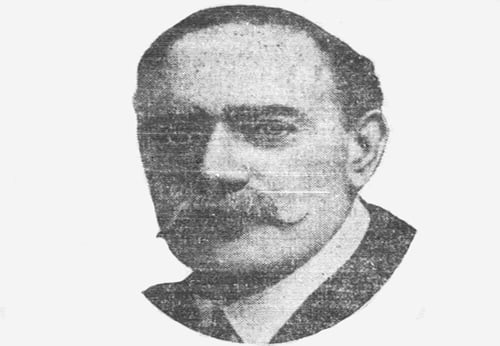- James Monro was the Assistant Police Commissioner and head of the C.I.D from 1884 to 1888.
- Just as the Jack the Ripper murders got underway, he resigned, following frequent clashes with the Commissioner, Sir Charles Warren.
- When Warren resigned, in November, 1888, it was Monro who was chosen to replace him as Metropolitan Police Commissioner.
- However, in June 1890, he too resigned and would spend the remainder of his working life as a missionary in India.
- Site Author and Publisher Richard Jones
- Richard Jones
JAMES MONRO
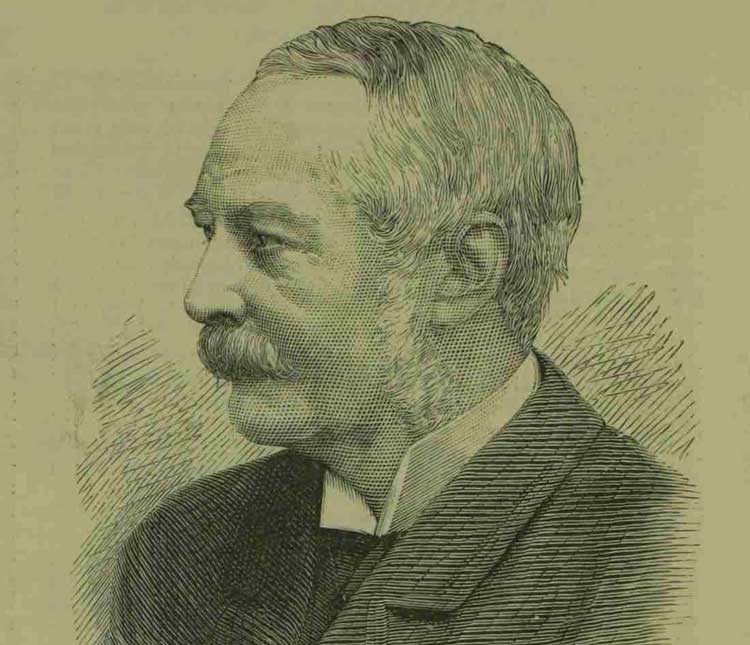
ASSISTANT COMMISSIONER AND COMMISSIONER
James Monro began his police career in India where, on 10th April, 1877, he was made Inspector General of the Police of Lower Bengal, a position he held until 1882, when he became Commissioner.
Many years later, reminiscing about his tenure in the post, The Scotsman had this to say in its edition of Friday 30th November, 1884:-
...With an eagle eye and a firm hand, he brought into the service the instinct of the born detective in tracing out crime, and his name became a word of terror to the subtlest native conspirators within his jurisdiction.
SIR HENRY COTTON'S RECOLLECTION
In his memoirs, published in 1911, Sir Henry John Stedman Cotton (1845 - 1915), who had served under Monro in his early career as a civil servant, wrote of his old boss:-
...When I served under him he was in his prime, a terror to evildoers, a sleuth-hound in the detection of crime, fearing nothing, daring all things, deliberately straining every section of law and procedure, and falling many times under the correction of the High Court for irregularities and even worse transgressions. He was known among a certain class as the keate, or black cobra Sahib, and was the ideal of what is called in official language a strong Magistrate. He was my official superior. I was then very young, only twenty-four years of age, and I confess that I admired him greatly and was completely carried away by the glamour of his achievements."
HOWARD VINCENT'S RESIGNATION
Fortuitously, Monro just happened to be in London when Howard Vincent resigned as Director of the Metropolitan Police's Criminal Investigation Department
Seizing the opportunity, Monro applied for the position, and, despite the fact that he was, according to The Scotsman, "...totally unknown to any person of influence in connection with the Home Office...", he was made Assistant Commissioner and Head of the Criminal Investigation Department, "purely on the strength of his personal "record", as shown in the Indian Blue-books."
THE TERRORIST THREAT
His appointment came at a time when the threat from Fenian terrorism on the streets of London was increasing at an alarming pace and Monro found himself pitched into the frontline in the war on terror.
However, also battling the threat was Edward Jenkinson, who was running an ultra-secret department under the auspices of the Home Office, and who was determined to share as little information as he possibly could with his counterpart in the Metropolitan Police, Assistant Commissioner, James Monro.
Monro and Jenkinson came to loathe one another, and a bitter power struggle developed between the two men which would rage around the corridors of power for the best part of two years, before, in early 1887, Monro emerged victorious and Edward Jenkinson was relieved of his secret duties.
A NEW TOP SECRET DEPARTMENT
The Home Secretary Sir Henry Matthews placed Monro in charge of a newly created national security service, which was variously referred to as "Section D", "the Secret Department", or "the Home Office Crime Department."
This meant that Monro assumed two roles, and was answerable to two different superiors.
In his role as Assistant Metropolitan Police Commissioner, his immediate superior would the Chief Commissioner, Sir Charles Warren.
But, as the chief of the newly created Secret Department, he was, in fact, directly answerable to Warren's superior, Sir Henry Matthews.
This meant that Warren, as Metropolitan Police Commissioner, found himself in the awkward - and, as he saw it, untenable - position of having a subordinate over much of whose work he had neither authority nor influence.
WARREN AND MONRO AT LOGGERHEADS
In November 1887, Monro complained to Warren that he was overworked, and suggested that a new post, that of Assistant Chief Constable, be created to relieve the strain he was under. He even had a suggested candidate for the post - Melville Macnaghten, an old friend of his from his days in India.
Warren, though, was having none of it, and he vetoed Monro's choice and suggested instead that Monro should give up his Section D Duties.
Relations between the two men deteriorated at an alarming rate over the next seven months, and, by August 1888, Monro had tendered his resignation as head of the Criminal Investigation Department.
On 4th September, 1888,The Pall Mall Gazette enlightened its readers as to the cause of the friction between the Chief Commissioner and his subordinate:-
The disputes between Sir Charles Warren and Mr. Monro arose out of representations made by the latter respecting the numerical weakness of the staff of the Criminal Investigation Departments, coupled with a request for the appointment of an assistant chief constable and a few additional subordinate officers.
Sir Charles Warren was not at first inclined to accede to Mr. Monro's request, but ultimately, taking into account the fact that Chief Constable Williamson was at the moment absent through illness, he agreed to the appointment of an assistant chief constable.
A gentleman of large Indian experience was recommended for the post, with the acquiescence of the Chief Commissioner, and the recommendation was formally made to the Secretary of State.
But, before the appointment had been actually made, Sir Charles Warren withdrew his recommendation, on the ground that circumstances had come to his knowledge which made it undesirable that the gentleman in question should be appointed.
The appointment was never made, and the question of creating the new post remains in abeyance.
This did not improve the relations between Sir Charles Warren and Mr. Monro.
Matters reached a crisis early in July, when the Chief Commissioner and Mr. Mono went to the Home Office and had a lengthy interview with the Secretary of State at which it was decided that Mr. Monro should immediately take leave of absence, with a view to his subsequent resignation."
A NEW POSITION
However, if Warren believed he was now rid of his troublesome underling he was very much mistaken, for Monro, had the full support of the Home Secretary, and he was promptly put in charge of his own department at the Home Office.
The South Wales Echo reported on Monro's new appointment in its edition of 4th September, 1888:-
...Mr James Monro, C.B., late chief of the Criminal Investigation Department at Scotland Yard, has received an important appointment, at the Home Office, and assumed the duties of his new post on Monday.
Colonel Wilkinson has been appointed assistant to Mr Monro, and both gentlemen were busily engaged at the Home Office during the day.
The unofficial announcement of Mr Monro's appointment has caused considerable surprise at Scotland Yard, and in official circles generally, and much curiosity is felt as to the duties connected with his new post.
On this point the authorities absolutely refuse any information."
STILL BRIEFING THE DETECTIVES
Monro may have "moved on" from his post at Scotland Yard, but he was still there in the background, and it seems that many of the CID detectives working on the Jack the Ripper case still saw themselves as answerable to their old chief.
Indeed, as the Whitechapel murders increased in number, there were press reports that the superintendents on the case were, in fact, consulting Monro and not reporting to Sir Charles Warren. Furthermore, it would seem that they were doing so with the full knowledge and encouragement of the Home Secretary, Sir Henry Matthews.
Something of the position that Warren found himself in can be gleaned from the following report, which appeared in The Manchester Weekly Times on Saturday, November 17th, 1888:-
Since Mr. Monro's transference to the Home Office...Sir Charles complains that whereas he has been saddled with all the responsibility he has had no freedom of action and, in consequence, his position has daily become more unbearable.
Although Mr Monro has been no longer in evidence at Whitehall Place [the then headquarters of the Metropolitan Police], he has, to all intents and purposes, retained control of the Criminal Investigation Department, Indeed, Mr. Matthews admits that he is deriving the benefit of the advice of Mr. Monro in matters relating to crime...Latterly, in spite of the remonstrances of Sir Charles Warren, the control of the Criminal Investigation Department has been withdrawn more and more from Whitehall Place.
Every morning for the last few weeks there has been a protracted conference at the Home Office between Mr Monro, Mr Anderson and the principle detective inspectors, and the information furnished to the Commissioner with regard to these conferences has been of the status of the scantiest character..."
JAMES MONRO BECOMES POLICE COMMISSIONER
The above report appeared following Sir Charles Warren's resignation, albeit, at the time he was still in office awaiting the appointment of a successor as Metropolitan Police Commissioner.
More than a few eyebrows were raised when, towards the end of November, 1888, the new appointee was announced as none other than James Monro.
Indeed, several sections of the press viewed the appointment as proof of a concerted conspiracy between the Home Secretary and James Monro to oust Warren and replace him with Monro.
On Thursday, 29th November, 1888, The Pall Gazette - a newspaper that had been no great fan of Sir Charles Warren's Commissionership - had this to say about the seeming skullduggery behind the new appointment:-
The appointment of Mr. Monro as Chief Commissioner of the Metropolitan Police, instead of closing the controversy that has raged between Scotland Yard and the Home Office, will be but the beginning of fresh strife.
To begin with, it sheds a very ugly light upon the dispute between Mr. Matthews and Sir Charles Warren.
What Sir Charles Warren's friends have been saying for some time past will now appear to have been confirmed by the new appointment.
What they have said is that Sir Charles has been betrayed by an intrigue between his official superior and his official subordinate, who worked together to spill Sir Charles and then to secure Mr Monro's appointment to the vacant post.
There might not be an atom of foundation for this assertion, but the appointment of Mr. Monro will be pointed to as affording a significant confirmation of the existence of an understanding between the Home Secretary and the assistant who has now supplanted his chief..."
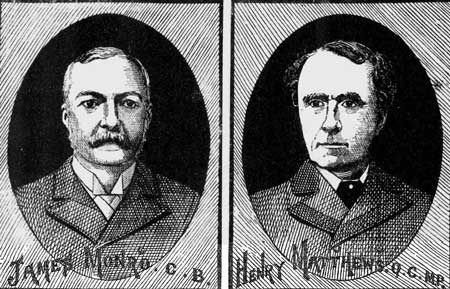
From The Illustrated Police News, Saturday, 21st June, 1890
Copyright, The British Library Board.
PRAISE FOR THE NEW COMMISSIONER
However, many newspapers were in favour of Monro's appointment, amongst them The Nottingham Evening Post, which published the following announcement of his appointment on Monday, 26th November, 1888:-
The Cabinet, I believe, decided yesterday upon the appointment of Mr. James Monro as Commissioner of the Metropolitan Police.
It is understood that the selection will meet with unanimous approval in London, for Londoners have not forgotten Mr. Monro's services in unravelling and frustrating the dynamite plot concocted by "General" Miller at the time of the celebration of the Queen's Jubilee.
On that occasion Mr. Monro, when he had completed his information, and believing prevention to be better than punishment, went over to Paris and had a friendly chat with General Miller, telling him that all his plans were known to the police, that he was being closely watched, that if he ventured to land in England he would be immediately arrested, and that in the event of conviction he would probably be sent to penal servitude for life.
In these circumstances, Mr. Monro advised General Miller to set sail for America, which he did in the course of 48 hours.
It was Mr. Monro also who so cleverly "shadowed" a dynamiter, so gently moved him from place to place, that when at last he thought he had found a sanctuary from police surveillance at Islington, he was really a lodger in the house of a detective!
From the start, Mr. Monro was regarded by those "in the know" as the only possible candidate.
It was a case of Monro first and the rest nowhere.
Everyone admits the great qualifications of the head constables of Manchester and Birmingham, but there was a strong feeling against appointing anyone who had no metropolitan experience."
THE WHITECHAPEL MURDERS
During Monro's tenure as Metropolitan Police Commissioner, three Whitechapel murders - those of Rose Mylett, Alice McKenzie, and the unknown victim the Pinchin Street torso - occurred, and, since Dr. Robert Anderson was away on leave at the time of the murder of Alice McKenzie, in July, 1889, James Monro took personal control of the investigation into the crime.
JAMES MONRO RESIGNS
However, Monro fared little better than his predecessor in the chair of the Chief Commissioner, and, in June 1890, he too tendered his resignation.
His resignation was prompted by, amongst other things, the fact that he had urged Sir Henry Matthews to speed legislation through Parliament that would improve the lot of police officers, in particular with regards to the pensions, and when this didn't happen, Monro tendered his resignation and Matthews accepted it.
According to The South Wales Daily News, which carried a report on his resignation on Friday, 13th June, 1890:-
Intelligence of the resignation has created great consternation among the metropolitan police force, in which for many years the Commissioner has been a great favourite with the men.
It is stated in police circles that since Mr. Monro accepted the post...he has done much to establish a satisfactory system of administration and to improve the condition of the men..."
Article Sources
Sir Henry Cotton K.C.S.I Indian and Home Memories. T. Fisher Unwin (1911)
The Scotsman, Friday 30th November, 1884
The Pall Mall Gazette, 4th September, 1888
The South Wales Echo, 4th September, 1888
The Manchester Weekly Times, Saturday, November 17th, 1888
The Nottingham Evening Post, Monday, 26th November, 1888
The Pall Mall Gazette, Thursday, 29th November, 1888
The South Wales Daily News, Friday, 13th June, 1890
The Illustrated Police News, Saturday, 21st June, 1890
Paul Begg, Martin Fido and Keith Skinner. The Jack the Ripper A to Z. Headline Book Publishing Plc (1992)

